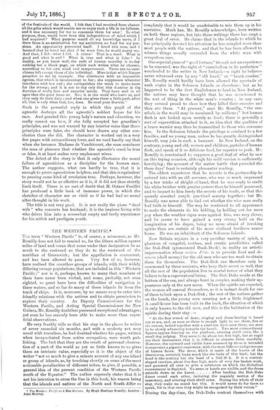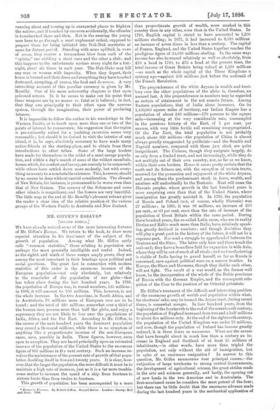THE WESTERN PACIFIC.* THE term "Western Pacific" is, of coarse,
a misnomer, as Mr. Romilly does not fail to remind us, for the fifteen million square miles of land and ocean that come under that designation lie as much to the eastward as they do to the westward of the meridian of Greenwich ; but the appellation is convenient, and has been allowed to pass. Very few of us, however, have realised the countless groups of islands, with their widely differing savage populations, that are included in this "Western Pacific ;" nor is it, perhaps, known to many that numbers of them have never been visited, and some, probably, not even sighted, so great have been the difficulties of navigation in these waters, and so far do many of these islands lie from the track of ships. It is, moreover, by no means easy to enter into friendly relations with the natives and to obtain permission to explore their country. As Deputy Commissioner for the Western Pacific, and Acting Special Commissioner for New Guinea, Mr. Romilly doubtless possessed exceptional advantages; yet even he has scarcely been able to make more than super- ficial observations.
He very frankly tells us that his stay in the places he writes of never exceeded six months, and with a modesty not very usual with travellers, he had doubted whether his pages, written when incapacitated from active occupation, were worth pub- lishing. The fact that they are the result of personal observa- tion of a part of the world as yet so little known to us gives them an intrinsic value, especially as it is the object of the writer "not so much to give a minute account of any one island or group of islands, as, by touching shortly on some of the most noticeable peculiarities of different tribes, to give, if possible, a general idea of the present condition of the Western Pacific south of the Equator." The author expressly states that it is not his intention to cross the line in this book, his reason being that the islands and natives of the North and South differ so The Western Pacific a, S New Guinea. By Hugh Haatinga Romilly. London : John Murray.
completely that it would be unadvisable to mix them up in his narrative. Mach has, Mr. Romilly acknowledges, been written on both these regions, but into these writings there has crept a great deal of error. He claims that in the islands to which he has principally devoted his attention he has mingled more than most people with the natives, and that he has been allowed to witness things usually concealed from the white man with scrupulous care.
One especial piece of" good fortune," though not an experience to be repeated, was the sight of "cannibalism in its perfection" vouchsafed to the writer in New Ireland,—a sight he believes never witnessed even by any "old hand," or "beach-comber." Mr. Romilly would hardly have been allowed the spectacle of such orgies in the Solomon Islands or elsewhere; but as he happened to be the first Englishman to land in New Ireland, the natives may have thought that he was accustomed to the sort of thing in the white man's country ; in any case, they seemed proud to show how they killed their enemies and then ats them. "At present," says Mr. Romilly, "the can- nibals in the world may be numbered by millions ;" but human flesh is not looked upon merely as food ; there is generally a sort of superstition attached to it, an idea that the qualities of a brave warrior may thus be transmitted to those who consume him. In the Solomon islands the privilege is confined to a few families, and no young man, unless he has greatly distinguished himself, may join in such a banquet. In New Ireland, on the contrary, young and old, women and children, partake of human flesh, and speak of it as delicious food, far superior to pork. Mr. Romilly is constrained to suppress a good deal of what he saw on this trying occasion, although his mild version is sufficiently horrifying ; the account of the native battle that preceded the three days' feast is certainly pleasanter reading.
The oddest experience that be records is the partnership he entered into with an old sorcerer, who was so much impressed
by a few tricks of sleight-of-hand, that he was ready to credit his white brother with greater powers than he himself possessed, and to impart to him freely the secrets of his trade, so that this queerly assorted couple practised sorcery together ; but Mr.
Romilly was never able to find out whether the wise man really had faith in himself. The way he contrived to all appearance to make the elements do his bidding, by holding out for more psy when the weather signs were against him, was very clever, and he seems to have gained a very strong hold on the imagination of his dupes, being no more afraid of invoking spirits than are certain of his more civilised brethren nearer home. He was an inhabitant of the Solomon Islands.
New Britain rejoices in a very peculiar variety of spirit, a phantom of vengeful, restless, and erratic proclivities called the Duk-Duk (pronounced Dook-Dook), in reality an artistic impersonation whose raison d'/re is to provide food and de- toarra (shell money) for the old men who are too weak to obtain
them for themselves. The Duk-Duk can therefore only be summoned by these ancients, who keep their secret so well, that all the rest of the population live in mortal terror of what they believe to be a supernatural being. The Duk-Duks reside at the bottom of the sea, and always hunt in couples, making their ap- pearance only at the new moon. When the spirits are expected, the women all conceal themselves, as it is instant death for one of them to look upon a Duk-Duk ; the rest of the natives gather on the beach, the young men seeming not a little frightened. A small house has been built in the bush, the situation of which is only known to the old men, and this is the habitation of the spirits during their stay :—
"At the first streak of dawn, singing and drum-beating is heard out at sea, and, as soon as there is enough light to see them, five or six canoes, lashed together with a platform built over them, are seen to be slowly advancing towards the beach. Two most extraordinary figures appear dancing on the platform, uttering shrill cries, like a small dog yelping. They seem to be about ten feet high, but an rapid are their movements that it is difficult to observe them carefully. However, the outward and visible form assumed by them is intended to represent a gigantic cassowary, with the most hideous and grotesque of human faces. The dress, which is made of the leaves of the draconrena, certainly looks much like the body of this bird ; but the head is like nothing but the head of a Dak-D .k. It is a conical- shaped erection, about fire feet high, made of very fine basket-work, and gummed all over to give a substance on which the diabolical countenance is depicted. No arms or hands are visible, and the dress
extends down to the knees After landing, the Duk-Duk dance round each other, imitating the ungainly motion of the cassowary, and uttering their shrill cries. Daring the whole of their stay, they make no sound but this. It would never do for them to speak, for in that case they might be recognised by their voices."
During the day-time, the Duk-Duks content themselves with
running about and turning up in unexpected places to frighten the natives, and if touched by one even accidentally, the offender is tomahawked there and then. Bat in the evening the young men have to go through a most unpleasant ordeal, supposed to prepare them for being initiated into Duk-Duk mysteries at some far distant period. Standing with arms uplifted, in rows of seven, they receive a tremendous blow from each of the "spirits," one wielding a stout cane and the other a club; and this happens to the unfortunate novices every night for a fort- night, about six times in each year. The Duk-Duks may kill any man or woman with impunity. When they depart, their house is burned and their dress and everything they have touched destroyed, excepting, of course, the food and de-warra. A very interesting account of this peculiar currency is given by Mr. Romilly. One of his more noteworthy chapters is that upon poisoned arrows. In it he seems to make out his point that these weapons are by no means so fatal as is believed ; in fact, that they owe principally to their effect upon the nervous system, through the imagination, their power of producing tetanus.
It is impossible to follow the author in his wanderings in the Western Pacific, or to touch upon more than one or two of the points of interest he enumerates ; his suggestion that the region is pre-eminently suited for a -yachting excursion seems very reasonable ; bat should it be desired to visit the interior of any island, it is, he says, absolutely necessary to have made many native friends at the starting-place, and to obtain from them introductions to other tribes. Some of the large traders have made for themselves in the midst of a semi-savage popula- tion, and within a day's march of some of the wildest cannibals, homes which, for comfort and luxury, are scarcely to be surpassed; while others have settled down more modestly, but with every- thing necessary to a comfortable existence. This, however, should by no means be done without careful consideration. The climate of New Britain, for instance, is pronounced to be worse even than that of New Guinea. The scenery of the Solomons and some other islands is magnificent, and the flowers are very beautiful. The little map at the end of Mr. Romilly's pleasant volume gives the reader a clear idea of the relative position of the various groups of the Western Pacific to Australia and New Zealand.



































 Previous page
Previous page